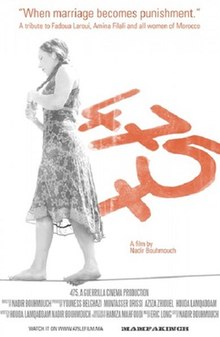475 (film)
| 475 | |
|---|---|
 Film poster | |
| Directed by | Nadir Bouhmouch |
| Written by | Nadir Bouhmouch, Houda Lamqaddam |
| Produced by | Aziza Zriouel, Montasser Drissi |
| Cinematography | Hamza Mahfoudi, Amina Benalioulhaj |
| Edited by | Nadir Bouhmouch |
Release date |
|
Running time | 63 minutes |
| Country | Morocco |
| Language | Arabic |
475 is a 2013 Moroccan documentary film by director Nadir Bouhmouch. The film explores sexual violence and women's rights in Morocco through the Amina Filali affair, a young girl who committed suicide after being forced to marry her rapist in 2012.[2]
Synopsis
[edit]In March 2012, Amina Filali, a 16-year-old Moroccan girl, committed suicide by swallowing rat poison in a small village outside of Larache. Her suicide came a year after she was forced to marry a man who had raped her. According to Article 475 of the Moroccan penal code, a rapist can escape a jail sentence if he marries his victim. Authorities in Morocco failed to properly investigate Filali's death. Amina's death dominated the Moroccan and international media. Through this horrifying affair, interviews with Filali's parents, her rapist's father, a lawyer and other members of Moroccan civil society, the film delves into the various facets of patriarchy in Morocco while questioning the way it was portrayed by the mainstream media.[3]
Production
[edit]Like Bouhmouch's first film My Makhzen and Me, 475 was produced clandestinely with no shooting permits in what director Nadir Bouhmouch calls "an act of civil disobedience" against Morocco's state film institution, the Centre Cinematographique Marocain (CCM); and what they perceive as restrictive film laws and censorship. The crew was reduced to a small team of volunteers who had little or no experience in filmmaking.[4] Instead of asking for state funding from the CCM, the filmmakers resorted to a crowd-funding campaign.[5][better source needed]
References
[edit]- ^ "Exposing Sexual Violence in Morocco: An Interview with Nadir Bouhmouch". Jadaliyya - جدلية. Retrieved 17 May 2020.
- ^ "Exposing Sexual Violence in Morocco: An Interview with Nadir Bouhmouch". jadaliyya.com.
- ^ "A Sense of Civic Responsibility". BBC. 18 September 2014. Retrieved 19 October 2015.
- ^ "Guerrilla filmmakers celebrate anniversary of Morocco's 'Arab uprising'". GlobalPost. Retrieved 19 October 2015.
- ^ "475: When Marriage Becomes Punishment". Kickstarter. Retrieved 31 October 2015.
External links
[edit]- Official page on Facebook
- 475 at IMDb
- 2013 films
- 2010s Arabic-language films
- Moroccan documentary films
- 2013 documentary films
- Women's rights in Morocco
- Documentary films about politics
- Documentary films about violence against women
- Documentary films about women in Africa
- Kickstarter-funded documentaries
- Films directed by Nadir Bouhmouch
- Violence against women in Morocco
- Moroccan film stubs
- 2010s documentary film stubs
